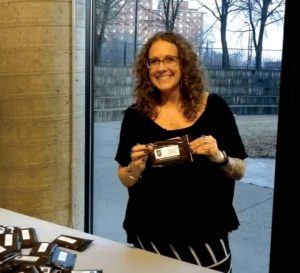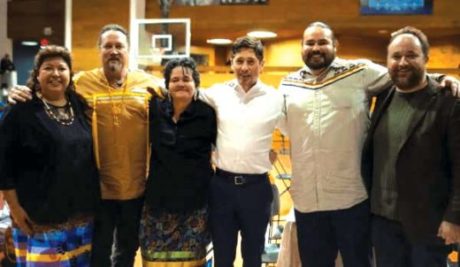162 sheltered at Navigation Center, 119 placed in housing and over 100 sheltered
by Camille Gage
Editor”'s note: This article originally appeared as a blog post at www.franklinhiawathacamp.org.
On Friday, Jan. 11, a feast was held at the Minneapolis American Indian Center. It had been three weeks to the day since the last residents of the Franklin Hiawatha encampment were moved to the new Minneapolis Navigation Center. It was, and remains, a time of cautious hope and pragmatic optimism.
No one thought the move to the new Navigation Center would be easy. As winter approached, relocating residents as quickly as possible became the pressing goal, with the specter of 100+ tents flapping in the bitter wind and freezing temps bringing an intense urgency to the work. More time for setting up processes and systems would have been useful, but it was a luxury no one could afford.
In the end the encampment was closed without protest or incident. Over the past four months every individual who sought shelter was found housing, shelter, or taken to the new Navigation Center. No one was left behind. From August 2018, when Native-led and other agencies began their efforts:
Ӣ 119 have been placed in housing (with more move-ins pending)
Ӣ 100+ have been sheltered (exact numbers unknown as some were family groups)
Ӣ162 have found temporary shelter in the Navigation Center.
Gratitude and recognition is due the housing specialists at Avivo and Hennepin County, and the staff at Simpson Housing, St Stephens, Minnesota Indian Women”'s Resource Center, and the American Indian Community Development Corporation. Gratitude as well to the Red Lake Nation, Native American Community Clinic, the tireless outreach, health and harm reduction workers, and to the leadership and member agencies of the Metropolitan Urban Indian Directors (MUID). Many of these groups continue to devote time, energy and resources to this work because the Navigation Center is not a typical shelter; it is intended to be a temporary refuge as more permanent housing and supportive services are found for each resident.
And so the work continues. In many ways it has just begun. The feast was a welcome chance to come together to reflect and reconnect for both residents and those who”'d worked side by side for months. It was also an opportunity to look toward the future, in the hopes of becoming more pro-active as we continue to address the issue of unsheltered homelessness, especially within the Native community.
As someone who was on the ground at the encampment, taking in the pain and struggle firsthand, I”'ve thought long and hard about what it took to create what is by any measure a success. Most cities simply bulldoze or break up tent camps, sweeping homeless individuals and the community”'s responsibility to care for them under the metaphorical rug.
Looking around the room at the feast, I saw my answer. Success was made possible because:
Ӣ The mayor, city council and department leadership took on the responsibility to care for the most vulnerable among us Рeven when it meant moving well outside their comfort zone in terms off financial commitment and the need for speed. The county and state were likewise engaged.
Ӣ The Native community Рincluding the Red Lake Nation and the leadership and member agencies of Metropolitan Urban Indian Directors Рstepped up to partner with each other and various government agencies in ways that were innovative and groundbreaking.
 Ӣ The Minneapolis Police Department stated unequivocally that being homeless is not a crime, and stepped up as partners, including deploying Grant Snyder, the MPD liaison to the homeless community, to assist daily at the camp.
Ӣ The Minneapolis Police Department stated unequivocally that being homeless is not a crime, and stepped up as partners, including deploying Grant Snyder, the MPD liaison to the homeless community, to assist daily at the camp.
Ӣ The Minneapolis Fire Department approached the encampment and those living there with full recognition of both the needs and the dangers inherent in a tent city in winter. They tried to do the right thing at every turn, including instituting a fire watch at the camp when the weather turned unbearably cold.
Ӣ Journalists took the time to educate themselves on the issues and truly engage everyone involved. This was a story that could have slid into sensationalism, but instead most of the journalists who covered the encampment gathered information from stakeholders at all levels, including camp residents. They also spent a serious amount of time in the camp, learning and observing firsthand.
Ӣ Finally, the community stepped up in a way that is almost impossible to overstate. Over 900 people emailed the camp through this website, offering donations, food, or to volunteer. Many more engaged via ad hoc Facebook groups. Literally thousands of meals were served by everyone from U of M students to church groups and book clubs. It took a village to keep a sprawling tent city population safe, warm, and fed, and the village showed up with generosity and conviction.
SUCCESS, IN A WORD
I believe that in the end what it took to create success amidst so much challenge and near-daily crisis can be summed up in single word: compassion. The compassionate intent of those involved formed an unbreakable web of connection and commitment. I am still musing on the power of this invisible force. We set out to transform a bleak situation into one of hope and possibility, and in the end we, ourselves, were transformed.
WiiDooKoDaaDiiWag: They help each other
Now we must take our compassion and turn towards the future. Housing the residents of the Franklin Hiawatha encampment was a needed but temporary fix. Building a Navigation Center did not end homelessness. There are still many challenges ahead.
With that in mind, last week”'s feast was also the perfect opportunity to kick off a Native American Community Development Institute (NACDI) initiative called WiiDooKoDaaDiiWag (Translation: ”˜They help each other”' in Ojibwe).Â
Through WiiDooKoDaaDiiWag, NACDI will host a series of gatherings which will center Native voices in the effort to create grassroots solutions to the issues facing the Indigenous community, especially the challenge of creating culturally appropriate and affordable housing, shelter and supportive services.
I invite all to follow the work of WiiDooKoDaaDiiWag and related efforts at www.franklinhiawathacamp.org in the weeks and months to come. And to everyone who made a donation, stepped up to volunteer, said a prayer, or engaged in any way: Thank you. We are one in this work now and always.











